“Our ambitions are way bigger”: Aaron Radin talks league growth at BBL All-Star
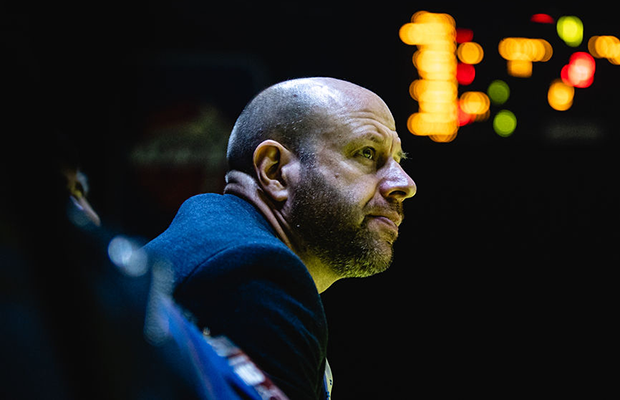
In the shadow of the British Basketball League (BBL) All-Star game, a symbolic centrepiece of Aaron Radin’s tenure as CEO, the league’s narrative is one of ambition tempered with reality.
Radin, with his grand vision, has undoubtedly pushed the league to new heights as he seeks to elevate its status within the UK’s football-dominated landscape but the path continues to be fraught with challenges.
The All-Star game, a new addition this season in replacement of the Cup competition, is a perfect case in point.
“We wanted to have a showcase event where we could highlight the top players,” Radin explained at a media round table before the game.
“Where basically we took a week off and promoted and had an opportunity to tell the stories of those players.”
Radin’s intention to deepen the connection between fans and players, improving the league’s storytelling, is something he has constantly emphasised in his eighteen months at the helm of the league.
“We needed vehicles to enable fans to connect with our players,” Radin underscored, once again referring to sports ability to offer “hope and memory.”
The All-Star game is one such vehicle but in its first year back in over two decades, has received a mixed reception, with a lot of empty seats in the 5,500 capacity Copper Box Arena.
If there are supposedly 1 million young people playing the sport in England every week, where are they?
“Perhaps most attractive to me about this opportunity as a whole is the large delta between the total addressable audience of people who are supposedly fans or are interested in basketball in this country and those that are engaged in this league,” Radin continued.
“This season has really been about trying to set a foundation upon which a) we can go and expand our fan base and b) which we can actually have a sustainable growing business. I probably didn’t make a great secret of the fact that I didn’t think we had those things prior.”
Central to this foundation is the quality of the product.
“Without a high quality product, you’re not on the map,” he continued.
“We’ve given ourselves an opportunity to compete.”
It is hard to argue that the quality of the product, from the broadcast, to content outputs and the level of player have not all significantly improved under Radin.
However, the league still continues to struggle for wider recognition and consistent media coverage, something he is well aware of.
“I’m not a patient person,” he admitted.
“I was hoping to get all these things in place for this year. In many ways, we’re sort of ahead of schedule in terms of getting the content pieces in place. There are other things that we are behind for a variety of reasons.
“But overall, I’m relatively pleased with the progress. If I think about where we were at this point last year and the difference, you know, to think, our games are on all over the world. We’re running different events. The look and feel of the league is just an entirely different level.
“People are starting to understand and have relationships with their players. That doesn’t mean that we’re not doing things that we can improve. We’re gonna make mistakes, and that’s okay.”
The core British basketball fan base, however, can be very unforgiving and cynical in nature.
“I think one of the things that’s been a challenge for me and for the team; you need to have thick skin when you make changes,” the CEO remarked.
“And that’s okay. We’re open for constructive criticism because we want the product to be great.”
Observers have acknowledged that Radin’s efforts to secure international broadcasting deals – they now have five in the US – has significantly increased the league’s global visibility (there are weeks when viewership in the U.S. surpasses that in the UK, he pointed out), though the impact of these deals on the league domestically is unclear.
“The biggest challenge is probably the cycle at which television deals are done,” Radin admits.
He highlights the complex task of synchronising the league’s expansion with the slow pace of industry standards.
When asked about potential new markets for the league, Radin enthusiastically responded, “The next market is here. We’re not done here.
“I would hope that we’ll have broader coverage than we do today. You know, that of course requires willing participants on either side. And we’re in conversations with all the right people.”
The CEO highlighted the challenges of overcoming inertia in a media industry that has long-ignored basketball and is also going through its own struggles with the changing landscape.
“The incentive structure to do something different is limited,” he mused, explaining you don’t risk losing your job by following the status quo.
“Yes, it’s frustrating. And actually, I think this is why the foundation piece is so important.”
Despite these obstacles, he remains hopeful.
“It should be natural that the BBC Sports page features our stuff and Sky Sports and ESPN…it’s a bit maddening. But we’ll get there, I’m confident we’ll get there eventually.”
Eventually is the key word. This is a long term project that will take time, and a lot of money, to achieve.
“If we’re going to do a major step change forward, it’s going to be because we’re going to, at some point, do something radically different that’s going to generate attention.
“Doing the same thing is not going to do it. We need to do something significantly different over time to generate that level of attention and step change.”
Radin’s ambitions extend beyond just expanding coverage; he envisions a transformative shift in the business itself.
“That’s not only a step change in coverage,” he continued.
“It’s a step change in the business. It’s not really good enough to say, oh, we’re going to grow 10 percent a year. Our ambitions are way bigger than that, particularly given the size of the market here.”
Radin declined to reveal the league’s revenue numbers, but did say revenues are starting to go in the right direction.
The BBL recently filed its accounts for the year to June 2023 showing a loss of a little under £3.9million.
With the increased head count and costs of the league’s operations, they will need to keep raising money from investors until a step change in the business occurs.
But what happens if they can’t find further investment?
“They’re (revenues) not where I want them to be yet by any stretch of the imagination, but they’re also about where I expected them to be at this point. And in that respect, I think we’re ahead in setting the foundation. And again, once you have an audience, once you have a product, there’s then a sales cycle that occurs.
“It’s not like you just turn it on and it’s like, okay, all the money just rains on your head. I think we’re in a good position. I also think that what we’re doing is attracting interest. I don’t worry about the fundability at this point.”
Interestingly, he pointed to the European basketball market being wildly under-monetised relative to the fandom and how much room for growth there is.
According to his research, basketball in Europe brings in 16 times less than football per fan, 8 times less than cricket and 7 times less than tennis. “That’s insane,” he said.
The Trophy Final in Birmingham in January also encapsulated the league’s willingness to experiment with new things.
Trying a new ‘final four’ format, with semi-finals on the Saturday and Final on the Saturday, disappointingly, it did not spark the interest or attendances one would have hoped.
The competition’s best funded and most talented franchise, the London Lions, failed to attract more than a spatter of travelling fans, with Cheshire Head Coach Ben Thomas throwing a barb in the post-game interview on Sky that “London had zero fans here.”
It is not an easy task to develop fandom – especially with the transient nature of the league (Radin says he has spoken to clubs about trying to sign players to multi-year deals) but something everyone agrees on, is that a thriving British league must feature British talent.
The league’s strategy here has failed to materialise with the league allowing six non-British players per roster this season, up from five last year, and four the year before that, a change that was not publicly announced and went under the radar.
“The goal was to increase roster flexibility, while maintaining a significant British presence across our rosters and enable opportunities for these players to develop and thrive,” Radin responded when asked about the change.
“We have been pleased with the quality of play this year as well as the significant contribution our British players are making to the success of the League.”
That said, two former BBL coaches recently told Hoopsfix they believe the opportunities for British players are limited. Looking at the data, it is hard to argue: home grown talent has received just 25% of all available minutes in the league this season so far.
In amongst all of this, the league is battling the same systemic issues the rest of the sport faces.
“You guys can have the next LeBron James in this country right now. There’s a 10 year old living with a single mother, and based on the way you fund sports, he’s gonna ride a horse.
“Like, that sucks for basketball here, but it also sucks for the horse!
“There’s no reason that there shouldn’t be five core indoor facilities in every major market in this country. It doesn’t cost a lot to do it. You’ll be running thousands of kids through there every single day.
“You gotta have places where people can play on a regular basis and be able to like grab talent early and train.
“My focus has been on, I’ve got to have a viable product, which will enable us the opportunity to then expand and say, okay, we’re going to expand our academy and have the resources on our academy and club programs and want to try and, work with either ourselves or commercial leaders in our community to build these types of facilities to play.
“That’s going to take time. That’s not going to happen overnight, but it’s absolutely a focus.
“The best thing that could ever happen to this league is to have a top British player rise up and come through this league and play here.”
We don’t disagree, and hopefully Radin and the league will continue to explore ways to cultivate and harness this potential, ultimately leading to a stronger, more visible British Basketball League that resonates with fans both at home and around the globe.

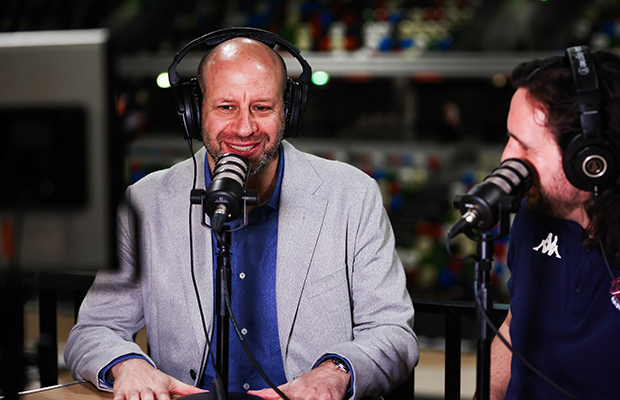
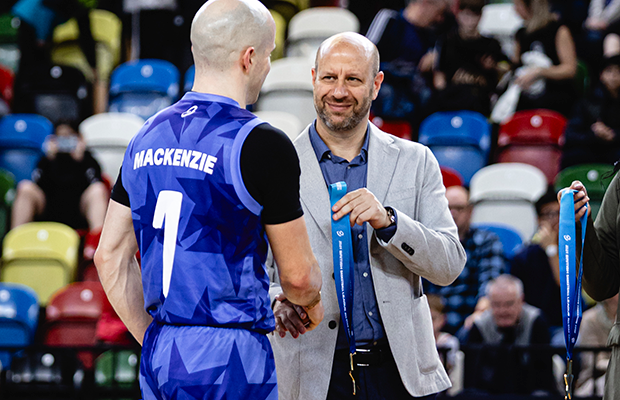
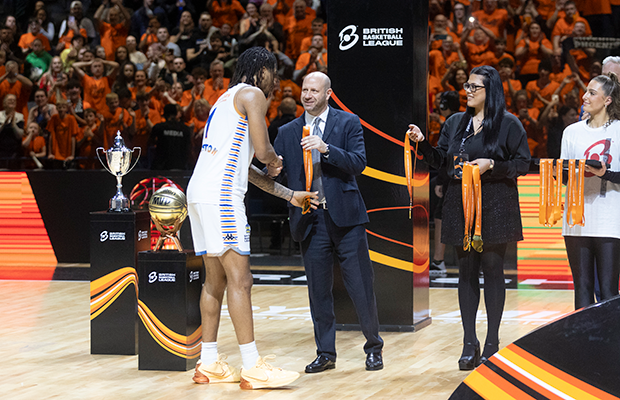
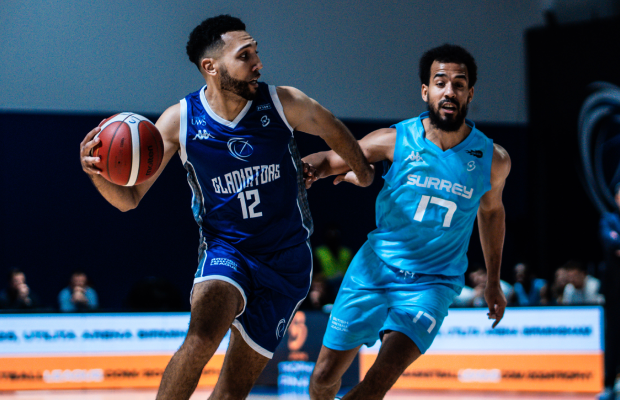





0 comments